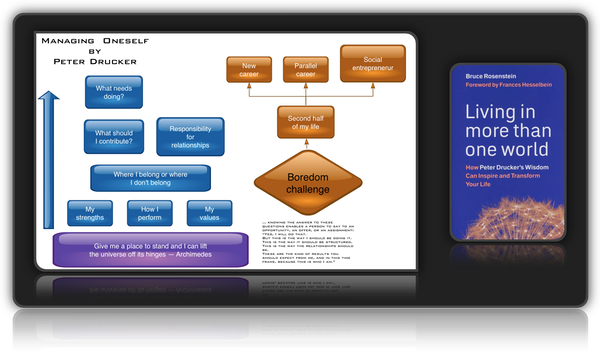Leadership
“To know something,
to really understand something important,
one must look at it from sixteen different angles.

People are perceptually slow,
and there is no shortcut to understanding;
it takes a great deal of time.” read more
Talk is cheap — don’t memorize, calendarize
(working something out in time in a changing, unpredictable world)
What needs to be done?
The situation matters
“The Society of Organizations” here — .
Think of it as a starting foundation for the road ahead

Why leadership-development programs fail — McKinsey Quarterly

Sidestepping four common mistakes
can help companies develop stronger and more capable leaders,
save time and money, and boost morale.
“For years, organizations have lavished time and money on improving the capabilities of managers and on nurturing new leaders.
US companies alone spend almost $14 billion annually on leadership development.
Colleges and universities offer hundreds of degree courses on leadership, and the cost of customized leadership-development offerings from a top business school can reach $150,000 a person.
Moreover, when upward of 500 executives were asked to rank their top three human-capital priorities, leadership development was included as both a current and a future priority.
Almost two-thirds of the respondents identified leadership development as their number-one concern.
Only 7 percent of senior managers polled by a UK business school think that their companies develop global leaders effectively, and around 30 percent of US companies admit that they have failed to exploit their international business opportunities fully because they lack enough leaders with the right capabilities.”

Tomorrow’s leader won’t be able to lead by charisma.
He or she will need to think through the fundamentals so that other people can work productively.
This will be quite demanding, especially considering the speed of change, the expectations of the new workforce, and an increasingly competitive world economy.
But it will also be demanding because it is no longer adequate to have a policy and expect it to carry you through the years.
Some companies, such as General Motors, AT&T, and Sears, have had success with long-term major policies.
But they are the exceptions; the truth is that ten years is common.
Now the changes are coming so fast that changes every three to four years will likely become commonplace.
Increasingly, a CEO’s job will be much more like the most complex job I know, which is running an opera.
You have your stars and you can’t give them orders; you have the supporting cast and the orchestra; you have the people who work behind the scenes; and you have your audience.
Each group is completely different.
But the opera conductor has a score, and everybody has the same score.
In a business you have to make sure all the various groups converge to produce the desired result.
This is the key to understanding what’s ahead.
It’s not about being less or more important, but differently important.
It’s not about refraining from giving orders—but knowing when to give an order and when to treat someone like a partner.
And it is not, I assure you, about playing down financial objectives; on the contrary, our demographics tell us that this will become more important.
But you will have to know how to integrate your financial objectives with the need to build and maintain a business.
Managing in the Next Society

The following quote—attributed to Peter Drucker—can be found the Internet:
Management is doing things right; leadership is doing the right things
I’ve read and outlined all of Drucker’s management books and I don’t remember ever seeing this quotation.
In fact the quotation is inconsistent with his published work.
It is contradicted by some of the statements below.
If Drucker really thought that leaders did the right thing, why didn’t he write a book on leadership?
Throughout human history there have been leaders, but …
Rarely in human history has any institution emerged as quickly as management or had as great an impact so fast.
In less than 150 years, management has transformed the social and economic fabric of the world’s developed countries.
It has created a global economy and set new rules for countries that would participate in that economy as equals.
And it has itself been transformed.
“AS WE ADVANCE deeper into the knowledge economy, the basic assumptions underlying much of what is taught and practiced in the name of management are hopelessly out of date.” — Management’s New Paradigm
Few executives are aware of the tremendous impact management has had …
Management
Drucker: a shock to the system
… but people have to practice management
and they need leaders plus
a foundation for future directed decisions …
A search for “leader” in Drucker’s books
turns up a surprising variety of contexts
“Leaders are not born, nor are they made — they are self-made.
To do this, a person needs focus.” read more
In The Effective Executive, Drucker stated that
Effective executives differ widely in their personalities, strengths, weaknesses, values, and beliefs.
All they have in common is that they get the right things done. (and not by accident — bobembry)
Practical Thinking and The Six Value Medals taken with
a “grain of salt” — not the whole story
In Managing the Non-Profit Organization
The non-profit organization exists to bring about a change in individuals and in society.
The first thing to talk about is what missions work and what missions don’t work, and how to define the mission.
 See Managing the Non-Profit Organization : Summary and detailed notes (better overview) See Managing the Non-Profit Organization : Summary and detailed notes (better overview)
 The Five Most Important Questions You Will Ever Ask About Your Organization The Five Most Important Questions You Will Ever Ask About Your Organization
 Effective missions Effective missions
For the ultimate test is not the beauty of the mission statement.
The ultimate test is right action.
Sidebar by bobembry (site developer): Right action depends on an adequate foundation for future directed decisions.
The most common question asked me by non-profit executives is: What are the qualities of a leader?
The question seems to assume that leadership is something you can learn in a charm school.
But it also assumes that leadership by itself is enough, that it’s an end.
And that’s misleadership.
The leader who basically focuses on himself or herself is going to mislead.
The three most charismatic leaders in this century
inflicted more suffering
on the human race
than almost any trio in history:
Hitler, Stalin, and Mao.

The Monster and the Lamb
What matters is not the leader’s charisma.
What matters is the leader’s mission.
Therefore, the first job of the leader is to think through and define the mission of the institution.
The Five Most Important Questions You Will Ever Ask About Your Nonprofit Organization
How to guarantee non-performance and What results should you expect? — a user’s guide to MBO
Conditions for survival
In Chapter 15 of Managing for the Future
Leadership is all the rage just now.
“We’d want you to run a seminar for us on how one acquires charisma,” the human resources VP of a big bank said to me on the telephone—in dead earnest.
Books, articles, and conferences on leadership and on the “qualities” of the leader abound.
Every CEO, it seems, has to be made to look like a dashing Confederate cavalry general or a boardroom Elvis Presley.
Leadership does matter, of course.
But, alas, it is something different from what is now touted under this label.
It has little to do with “leadership qualities” and even less to do with “charisma.”
It is mundane, unromantic and boring.
Its essence is performance …
sidebar begins
The goal is results and performance that fulfills a clearly stated mission—something that needs doing—something that creates value for a customer (something that is important to them as human beings—not the typical marketing BS but real marketing).
Peter told me over and over, “All results are on the outside.
On the inside is only cost and effort.”
… Another phrase I heard over and over in virtually every conversation with Peter has shaped my thinking: From good intentions to results and performance.”
Peter contended that most nonprofit organizations, almost all big foundations, and a good deal of government spending are invested in “good intentions.”
Outspoken About Outcomes for Nonprofits
Leap of Reason: Managing to Outcomes in an Era of Scarcity
In his typically brusque style, he once told me, “Tell your rich friends money has no results
If money were what made the difference, Egypt would be Japan.”
Peter wasn’t speaking against money.
He was simply saying that money alone won’t get results.
It might even impede results.
Bob Buford
Beyond Halftime
sidebar ends
… In the first place, leadership is not by itself good or desirable.
Leadership is a means.
Leadership to what end is thus the crucial question.
History knows no more charismatic leaders than this century’s triad of Stalin, Hitler, and Mao—the misleaders who inflicted as much evil and suffering on humanity as have ever been recorded.
…
The second requirement is that the leader see leadership as responsibility rather than as rank and privilege.
… another sidebar begins
Management's concern and management's responsibility are everything that affects the performance of the institution and its results—whether inside or outside, whether under the institution's control or totally beyond it. — Management's new paradigm
According to Peter Drucker, "Leaders in every single institution and in every single sector … have two responsibilities.
They are responsible and accountable for the performance of their institutions, and that requires them and their institutions to be concentrated, focused, limited.
They are responsible also, however, for the community as a whole."
But managing implies responsibility
for attempting to shape the economic environment;
for planning, initiating, and carrying through changes in that economic environment;
for constantly pushing back the limitations of economic circumstances on the enterprise’s ability to contribute.
The final requirement of effective leadership is to earn trust.
Otherwise there won’t be any followers—and the only definition of a leader is someone who has followers.
To trust a leader, it is not necessary to like him.
Nor is it necessary to agree with him.
Trust is the conviction that the leader means what he says.
It is a belief in something very old-fashioned, called “integrity.”
A leader’s actions and a leader’s professed beliefs must be congruent, or at least compatible.
Effective leadership—and again this is very old wisdom—is not based on being clever; it is based primarily on being consistent. (calendarize this?)
After I had said these things on the telephone to the bank’s human-resources VP, there was a long silence.
Finally she said: “But that’s no different at all from what we have known for years are the requirements for being an effective manager.”
Precisely.

From Leader of the Future

Amazon links:
The Leader of the Future: New Visions, Strategies and Practices for the Next Era
The Leader of the Future 2: Visions, Strategies, and Practices for the New Era (J-B Leader to Leader Institute/PF Drucker Foundation)
Not Enough Generals Were Killed
I have been working with organizations of all kinds for fifty years or more — as a teacher and administrator in the university, as a consultant to corporations, as a board member, as a volunteer.
Over the years, I have discussed with scores — perhaps even hundreds — of leaders their roles, their goals, and their performance.
I have worked with manufacturing giants and tiny firms, with organizations that span the world and others that work with severely handicapped children in one small town.
I have worked with some exceedingly bright executives and a few dummies, with people who talk a good deal about leadership and others who apparently never even think of themselves as leaders and who rarely, if ever, talk about leadership.
The lessons are unambiguous.
The first is that there may be “born leaders,” but there surely are far too few to depend on them.
Leadership must be learned and can be learned — and this, of course, is what this book was written for and should be used for.
But the second major lesson is that “leadership personality,” “leadership style,” and “leadership traits” do not exist.
Among the most effective leaders I have encountered and worked with in a half century, some locked themselves into their office and others were ultragregarious.
Some (though not many) were “nice guys” and others were stern disciplinarians.
Some were quick and impulsive; others studied and studied again and then took forever to come to a decision.
Some were warm and instantly “simpatico”; others remained aloof even after years of working closely with others, not only with outsiders like me but with the people within their own organization.
Some immediately spoke of their family; others never mentioned anything apart from the task in hand.
Some leaders were excruciatingly vain — and it did not affect their performance (as his spectacular vanity did not affect General Douglas MacArthur’s performance until the very end of his career).
Some were self-effacing to a fault — and again it did not affect their performance as leaders (as it did not affect the performance of General George Marshall or Harry Truman).
Some were as austere in their private lives as a hermit in the desert; others were ostentatious and pleasure-loving and whooped it up at every opportunity.
Some were good listeners, but among the most effective leaders I have worked with were also a few loners who listened only to their own inner voice.
The one and only personality trait the effective ones I have encountered did have in common was something they did not have: they had little or no “charisma” and little use either for the term or for what it signifies.
All the effective leaders I have encountered — both those I worked with and those I merely watched — knew four simple things:
1. The only definition of a leader is someone who has followers.
Some people are thinkers.
Some are prophets.
Both roles are important and badly needed.
But without followers, there can be no leaders.
2. An effective leader is not someone who is loved or admired.
He or she is someone whose followers do the right things.
Popularity is not leadership.
Results are.
3. Leaders are highly visible.
They therefore set examples.
4. Leadership is not rank, privileges, titles, or money.
It is responsibility.
Regardless of their almost limitless diversity with respect to personality, style, abilities, and interests, the effective leaders I have met, worked with, and observed also behaved much the same way:
1. They did not start out with the question, “What do I want?”
They started out asking, “What needs to be done?”
2. Then they asked, “What can and should I do to make a difference?”
This has to be something that both needs to be done and fits the leader’s strengths and the way she or he is most effective.
3. They constantly asked, “What are the organization’s mission and goals?
What constitutes performance and results in this organization?”
The Five Most Important Questions You Will Ever Ask About Your Nonprofit Organization and MBO: A User’s Guide
4. They were extremely tolerant of diversity in people and did not look for carbon copies of themselves.
It rarely even occurred to them to ask, “Do I like or dislike this person?”
But they were totatly—fiendishly—intolerant when it came to a person’s performance, standards, and values.
5. They were not afraid of strength in their associates.
They gloried in it.
Whether they had heard of it or not, their motto was what Andrew Carnegie wanted to have put on his tombstone: “Here lies a man who attracted better people into his service than he was himself.”
6. One way or another, they submitted themselves to the “mirror test” — that is, they made sure that the person they saw in the mirror in the morning was the kind of person they wanted to be, respect, and believe in.
This way they fortified themselves against the leader’s greatest temptations—to do things that are popular rather than right and to do petty, mean, sleazy things.
Finally, these effective leaders were not preachers; they were doers.
In the mid 1920s, when I was in my final high school years, a whole spate of books on World War I and its campaigns suddenly appeared in English, French, and German.
For our term project, our excellent history teacher — himself a badly wounded war veteran told each of us to pick several of these books, read them carefully, and write a major essay on our selections.
When we then discussed these essays in class, one of my fellow students said, “Every one of these books says that the Great War was a war of total military incompetence.
Why was it?”
Our teacher did not hesitate a second but shot right back, “Because not enough generals were killed; they stayed way behind the lines and let others do the fighting and dying.”
Effective leaders delegate a good many things; they have to or they drown in trivia.
But they do not delegate the one thing that only they can do with excellence, the one thing that will make a difference, the one thing that will set standards, the one thing they want to be remembered for.
They do it.
It does not matter what kind of organization you work in; you will find opportunities to learn about leadership from all organizations — public, private, and nonprofit.
Many people do not realize it, but the largest number of leadership jobs in the United States is in the nonprofit, social sector.
Nearly one million nonprofit organizations are active in this country today, and they provide excellent opportunities for learning about leadership.
The nonprofit sector is and has been the true growth sector in America’s society and economy.
It will become increasingly important during the coming years as more and more of the tasks that government was expected to do during the last thirty or forty years will have to be taken over by community organizations, that is, by nonprofit organizations.
more

From The Drucker Exchange
Leadership is the lifting of a (person’s) vision to higher sights, the raising of a (person’s) performance to a higher standard, the building of a (person’s) personality beyond its normal limitations.”
In the end, Drucker said, the essence of leadership is performance.
In other words, to be a good leader means being effective, and that’s something that gets learned through repetition.
“Effectiveness … is a habit; that is, a complex of practices,” Drucker declared in The Effective Executive.
“And practices can always be learned.
Practices are simple, deceptively so; even a seven-year-old has no difficulty in understanding a practice.
But practices are always exceedingly hard to do well.
They have to be acquired.”
Peter Drucker’s Legacy
During a discussion in graduate school, a professor challenged my first-year class: managers and leaders—are they different? The conversation unfolded something like this:
“Leaders set the vision; managers just figure out how to get there,” said one student.
“Leaders inspire and motivate, whereas managers keep things organized,” said another.
“Leaders elevate people to the highest values. Managers manage the details.”
The discussion revealed an underlying worship of “leadership” and a disdain for “management.” Leaders are inspired. Leaders are large. Leaders are the kids with black leather jackets, sunglasses, and sheer unadulterated cool. Managers, well, they’re the somewhat nerdy kids, decidedly less interesting, lacking charisma. And of course, we all wanted to be leaders, and leave the drudgery of management to others.
We could not have been more misguided and juvenile in our thinking. As Peter Drucker shows right here, in these pages, the very best leaders are first and foremost effective managers. Those who seek to lead but fail to manage will become either irrelevant or dangerous, not only to their organizations, but to society.
Business and social entrepreneur Bob Buford once observed that Drucker contributed as much to the triumph of free society as any other individual. I agree. For free society to function we must have high-performing, self-governed institutions in every sector, not just in business, but equally in the social sectors. Without that, as Drucker himself pointed out, the only workable alternative is totalitarian tyranny. Strong institutions, in turn, depend directly on excellent management, and no individual had a greater impact on the practice of management and no single book captures its essence better than his seminal text, Management.
Jim Collins
Boulder, Colorado
December, 2007
Built to Last
Good to Great
Effective leaders actually practice management and through their example lead others to do likewise.
Find “Level 5 Leadership” in Good to Great: Why Some Companies Make the Leap … and Others Don’t
Other
 Peter Drucker On Leadership Peter Drucker On Leadership
 78 Important Questions Every Leader Should Ask and Answer 78 Important Questions Every Leader Should Ask and Answer
 Leadership Jazz Leadership Jazz
 Leader of the future Leader of the future
 Leader of the future 2 Leader of the future 2
 Hesselbein on Leadership Hesselbein on Leadership
 Drucker on Leadership: New Lessons from the Father of Modern Management Drucker on Leadership: New Lessons from the Father of Modern Management
In the back of The Daily Drucker there is a page titled “Readings by Topic.” Leadership is covered on Jan 1, 15; Feb 14; Apr 3 and 5 through 14. A search for the word “leader” produces a list of many more topics — Kindle can do word searches
The society of organizations demands of the individual decisions regarding himself.
At first sight, the decision may appear only to concern career and livelihood.
“What shall I do?” is the form in which the question is usually asked.
But actually it reflects a demand that the individual take responsibility for society and its institutions.
“What cause do I want to serve?” is implied.
 The World is Full of Options The World is Full of Options
 Carefully choosing your nonprofit affiliations (beware of scams and inside-out bureaucracies because society suffers the consequences and you are part of society. Carefully choosing your nonprofit affiliations (beware of scams and inside-out bureaucracies because society suffers the consequences and you are part of society.
If they don’t produce the desired results outside of themselves then we have to pay a second or a third or a fourth … organization until we get what is needed.)
And underlying this question is the demand the individual take responsibility for himself.
 Managing Oneself then … Managing Oneself then …
 The Effective Executive: Preface The Effective Executive: Preface
“What shall I do with myself?” rather than “’What shall I do?” is really being asked of the young by the multitude of choices around them.
The society of organizations forces the individual to ask of himself:
 “Who am I?” “Who am I?”
 “What do I want to be?” “What do I want to be?”
 “What do I want to put into life and what do I want to get out of it?” “What do I want to put into life and what do I want to get out of it?”
read more on how can the individual survive …
The Age of Discontinuity:
Guidelines To Our Changing Society
enhanced by bobembry
... replace the quest for success with the quest for contribution.
(to the society of organizations moving in time — above)
The critical question is not, “How can I achieve?”
but “What can I contribute?”
The Daily Drucker
You can’t design your life around a temporary organization

Successful careers are not planned
They develop when people are prepared
for opportunities
because they know
their strengths,
their method of work, and
their values.
Knowing where one belongs
can transform an ordinary person
—hardworking and competent but otherwise mediocre—
into an outstanding performer.
Larger
Managing Oneself and Living in More than One World
To get the benefits you have to calendarize these
“What do you need to learn to get the most out of your strengths?”
The World is Full of Options
“What do you need to learn so that you can decide where to go next?”
Managing in a Time of Great Change
The three types of intelligence discussed in The Prince by Niccolò Machiavelli

Types of behavior that can be observed …

… “Power has to be used.
It is a reality.
If the decent and idealistic toss power in the gutter, the guttersnipes pick it up.
If the able and educated refuse to exercise power responsibly, irresponsible and incompetent people take over the seats of the mighty and the levers of power.
Power not being used for social purposes passes to people who use it for their own ends.
At best it is taken over by the careerists who are led by their own timidity into becoming arbitrary, autocratic, and bureaucratic.”
— How Can The Individual Survive?
The Age of Discontinuity: Guidelines To Our Changing Society
by Peter Drucker
What do you want to be remembered for?
In Landmarks of Tomorrow, Peter Drucker wrote “everyone is an understudy to the leading role in the drama of human destiny” and the “great roles are not written in the iambic pentameter or the Alexandrine of the heroic theater.”
They are, instead, “prosaic — played out in one’s daily life, in one’s work, in one’s citizenship, in one’s compassion or lack of it, in one’s courage to stick on an unpopular principle, and in one’s refusal to sanction man’s inhumanity to man in an age of cruelty and moral numbness.”
What are you going to calendarize from this page?
Those who ignore this (through apathy, arrogance, or complacency) essentially support the evil doers.

What do you want to be remembered for?
List of topics in this Folder
TLN Keywords: tlnkwleadership
|
![]()

![]()